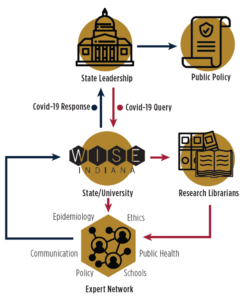This page has been archived. Last updated as of 22 Jan 2022 and may no longer be relevant
With the holiday season upon us in the midst of a pandemic, many people are wondering whether they should gather with family and friends, and if so, with whom – just those who are vaccinated or anyone regardless of vaccination status? This blog focuses on advice for navigating difficult conversations during the holiday season, which include whether to gather, people’s viewpoints on pandemic-related issues like vaccination, grief and loss, relationships, politics, etc.
Negative Test and Airline Travel
Women’s Health and COVID-19
Indeed, the COVID-19 pandemic disrupted health care delivery as we know it, often restricting access to routine health services. Women’s health was not immune to this disruption. In this month’s review, we discuss recent literature on inequities in women’s health during the COVID-19 pandemic.
Contraceptives
Breakthrough Infections
This preprint retrospective analysis identifies risk factors associated with breakthrough infections using electronic health record from Columbia University Irving Medical Center/New York Presbyterian. The researchers aimed to address the following:
With the COVID-19 pandemic still in full force, people continue to talk about how it affects daily living, what can be done to return to “normal,” and whether vaccination is the answer. In this analysis of more than 7 million tweets, researchers were able to determine what the public was talking about and how they felt about it. Administration and access to the vaccine were the biggest concerns and most felt fearful; however, others felt joy about the vaccinations. The authors argue that by recognizing trending topics, health communicators can better understand public concerns and emotions associated
Sociodemographic Factors and Mental Health Outcomes During the COVID-19 Pandemic
It is well known that the COVID-19 pandemic has had a detrimental impact on individual and population health. However, research has just recently gained momentum on assessing the pandemic’s potential impact on mental health and observed sociodemographic disparities. This month, we will be reviewing three recent peer-reviewed articles on this subject matter and authors’ suggested recommendations to mitigate these disparities.
1. Psychological Distress Among Adults in the US
COVID-19 Treatments – Safety and Efficacy
Communication by Key Leaders
With so many changes happening with COVID-19 protocols, it is not surprising that many people are confused or uninformed. This is especially true for individuals with school-aged children as each school is often tasked with coming up with their own safety policies regarding quarantines, masks, and vaccinations. It is important then for schools to understand effective communication strategies to educate families. This article addresses the challenges educators face when trying to communicate timely, transparent, culturally appropriate information in an efficient manner. Here are four suggestions for schools to consider when communicating about COVID-19:
COVID-19 Cases Among Adolescents
August means returning to school for many children. This year, many schools are attempting to return in-person, which is proving challenging with the accelerated spread of the COVID-19 Delta variant (97.6% of samples in August). Cases among adolescents (0 – 17 years of age) are as high as they’ve been since January 2021. With other respiratory viruses circulating in schools, it’s the perfect storm for illness spreading in schools.
Vaccine Comparison
The American Medical Association (AMA) strongly endorses COVID-19 vaccination and in an attempt to help improve vaccination rates, they are providing important information about the dangerous Delta variant. AMA Chief Health and Science Officer Mira Irons, MD, and AMA Board of Trustees Chair-elect and liaison to the CDC’s Advisory Committee on Immunization Practices Sandra Fryhofer, MD, wanted patients to know the following information about the current state of COVID-19:
Examining How We Collect Race and Ethnicity Data
Public Health Workforce


